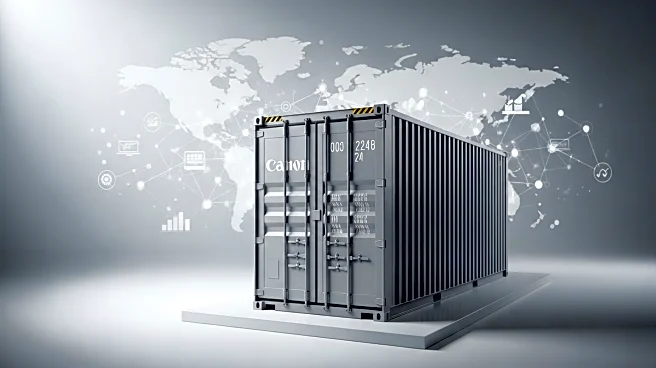What's Happening?
The United States has terminated the de minimis exemption, which previously allowed imports valued under $800 to enter the country without tariffs and customs duties. This policy change, effective August 2025, was initiated by the Trump administration to protect domestic industries and reduce counterfeit goods. The exemption's removal has significant implications for global supply chains, affecting logistics, e-commerce, and manufacturing sectors. Major logistics firms like DHL Express are facing substantial profit reductions due to increased tariffs and compliance costs, while smaller carriers have suspended U.S. shipments due to uncertainties in duty collection procedures. E-commerce platforms are experiencing price hikes on imported goods, leading to strategic shifts such as bulk shipping and domestic fulfillment to mitigate costs.
Why It's Important?
The elimination of the de minimis exemption is a pivotal shift in U.S. trade policy, impacting various sectors. Logistics companies are forced to adapt to new tariff structures, potentially leading to increased operational costs and changes in shipping strategies. E-commerce platforms face challenges in maintaining competitive pricing, which could affect consumer demand, especially among lower-income households. Manufacturing firms reliant on imported materials are experiencing profit erosion, prompting a reevaluation of supply chains and sourcing strategies. This policy change could accelerate nearshoring trends and increase demand for domestic logistics infrastructure, presenting opportunities for companies with robust U.S. operations and compliance technologies.
What's Next?
As the de minimis exemption ends, businesses are likely to explore domestic sourcing and partnerships to bypass tariffs, requiring significant capital investment. E-commerce growth may slow, with analysts projecting a decrease in growth rates due to increased costs. Legal challenges to the policy could introduce regulatory uncertainty, affecting market dynamics. Companies with diversified supplier networks and agile supply chains are better positioned to navigate these changes. Investors may focus on firms leveraging compliance technology and domestic logistics infrastructure to capitalize on the new trade environment.
Beyond the Headlines
The policy shift highlights broader implications for global trade and economic relations. It underscores the U.S. government's focus on protecting domestic industries and reducing reliance on foreign imports. The move may influence international trade negotiations and prompt retaliatory measures from affected countries. Additionally, the increased focus on compliance and domestic fulfillment could drive innovation in logistics and supply chain management, fostering advancements in technology and infrastructure.










